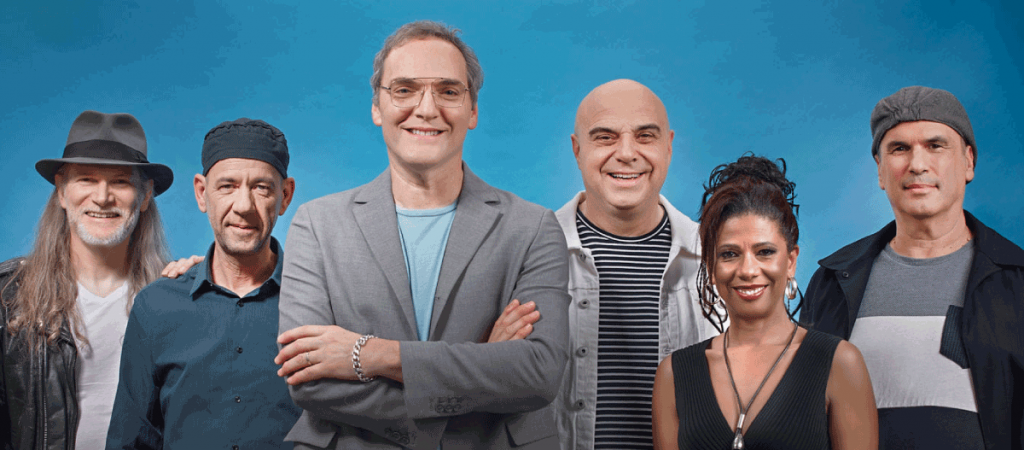The Delfins marked the Portuguese music scene in the 80s and 90s, they were present in some of the most remarkable moments, such as the Resistência project, and the album “O Caminho da Felicidade” is one of the best-selling albums ever in Portugal. The band lasted 25 years, from 1984 to 2009 (their last show was on the last night of the year in the bay of Cascais), they had more than 20 albums edited and in their 3 live dvd’s they showed one of their greatest strengths, the concerts and their interaction with the public.
Fernando Cunha (Guitar), Rui Fadigas (Bass), Jorge Quadros (Drums), Silvestre (Keyboard) and Miguel Ângelo (Vocalist) were the best-known line-up of the band, which had former members of Heróis do Mar such as Carlos Maria Trindade on keys and Pedro Ayres Magalhães on bass and the sisters Sara and Dora Fidalgo on backing vocals. The group from Cascais began to know success in one of the performances in that village, at the well-known Coconuts nightclub, in a version of “Canção de engate” by António Variações.
The success of the song, which was a hit on the dance floors that summer, led to the press giving more attention to this album and it was the target of good reviews. It was then that RTP called them to record two video clips, “Canção do Engate” and “Baía de Cascais”.
In 1988 they released the album “U outro lado existe”, which was considered the most surprising Portuguese music album of the time, and which had a strong criticism of the mandatory military service. The song “Bandeira” even became a youth anthem, which led to the edition of a maxi-single with a dedication to all the soldiers who had died in 88.
“Um Lugar ao Sol” is the last song to be successful in the group’s collaboration with the publishing house EMI-Valentim de Carvalho, since in the beginning of the 90’s they were the first hired by the publishing house BMG, thus inaugurating their National catalogue. That same year, the album “Desalinhados” was released, from which “Marcha dos Desalinhados” was the biggest hit along with the song “Nasce Selvagem”.
The group then begins a tour of the country where the song Marcha dos Desalinhados stands out, and when they performed the 1st part of Tina Turner’s concert, at Estádio José de Alvalade, they showed that they could win over the public with a performance that received the most widespread praise. of national criticism.
The album reaches the silver record mark, the band’s first important award, and in 1992 the band jumps beyond borders, being invited to perform in Seville at Expo-92, and takes the next step recording a very special album, and very own, “Being Greater – A Natural History”.
This disc gives rise to a multimedia show, at Teatro da Trindade in Lisbon, which sells out on 3 consecutive nights. The album focuses on the mysticism of the Sintra mountains and the Cascais coastline along a thematic narrative where a dolphin transforms into a man.
The band shows its originality by recording an underwater video clip, with the song “Ao passar de um Navio”, and they receive an invitation from the renowned director Carlos Avillez, to participate in the staging of the play “Brief summary of the history of God” by Gil Vicente. With the success of the play, and the song “Soltem os Prisioneiros”, an album with the same name was released in a year in which they also participated in the collection and in the show in honor of José Afonso, the Filhos da Madrugada. 1995 is the year of the Dolphins, they are invited to shows in Portugal and abroad as one who performed in Macau, in addition to appearing in the well-known Portugal live concert series 2 at the Bessa stadium in Porto.
The collection O Caminho da Felicidade is then released, where “Sou como um Rio” is the most played song, an album that sells thousands of units, breaking records in Portugal and becoming one of the best sellers in all of history. Already completely cemented in the music scene, it is not surprising that the album Saber Amar is also a bestseller, and that the group begins to perform around the world with emphasis on concerts in Brazil and Africa.
When we reach the 2000s and after a period of constant reformulation of the band, they release a new album of originals, which they call 7 and which is not at all well received by either the public or the critics. Even so, the first single, Hoje, is well received and considered one of the band’s best songs, but the worst comes with the second single, called “Sharon 7tone”, which is completely devastated and poorly accepted by the public.
I confess that I had already started to disconnect myself from the group, but this was the final blow and I never heard the same thing again. They continue their trajectory having found the path of success again in 2004 with the tour “O Caminho da Felicidade II”, supported by Rádio Comercial and where they perform in all cities with stadiums of Euro 2004, ending the tour with the show of opening of the Alcochete Freeport.
Until its end, in 2009, the group excelled in shows with a strong acoustic aspect and continued to publish albums, despite not having the success that their career had accustomed us to. Even so, it’s impossible not to remember this band as one of the best in national pop-rock, especially in the 80’s and 90’s.






can’t get enough of this artist! Each song feels like a new chapter in their musical journey